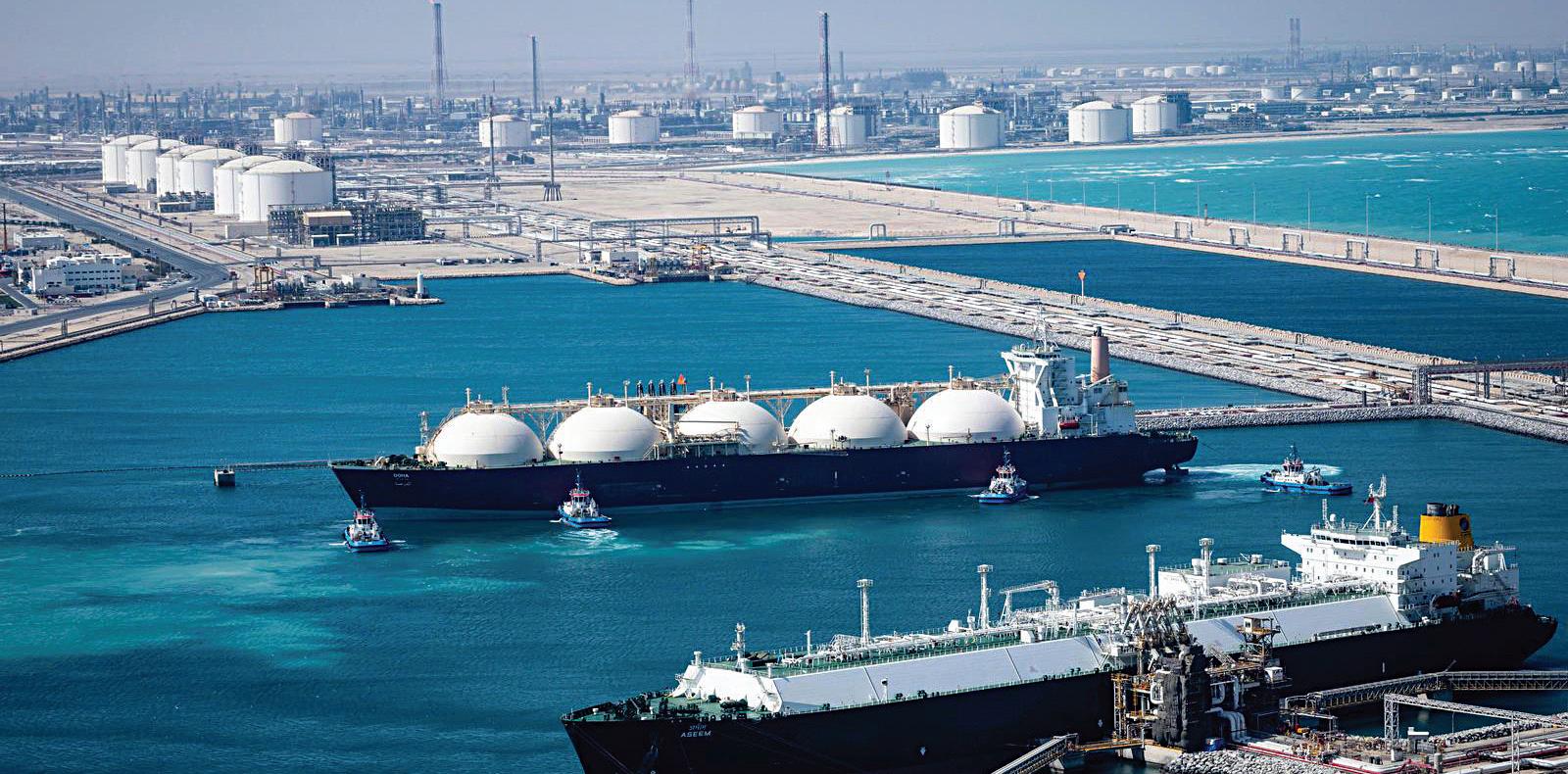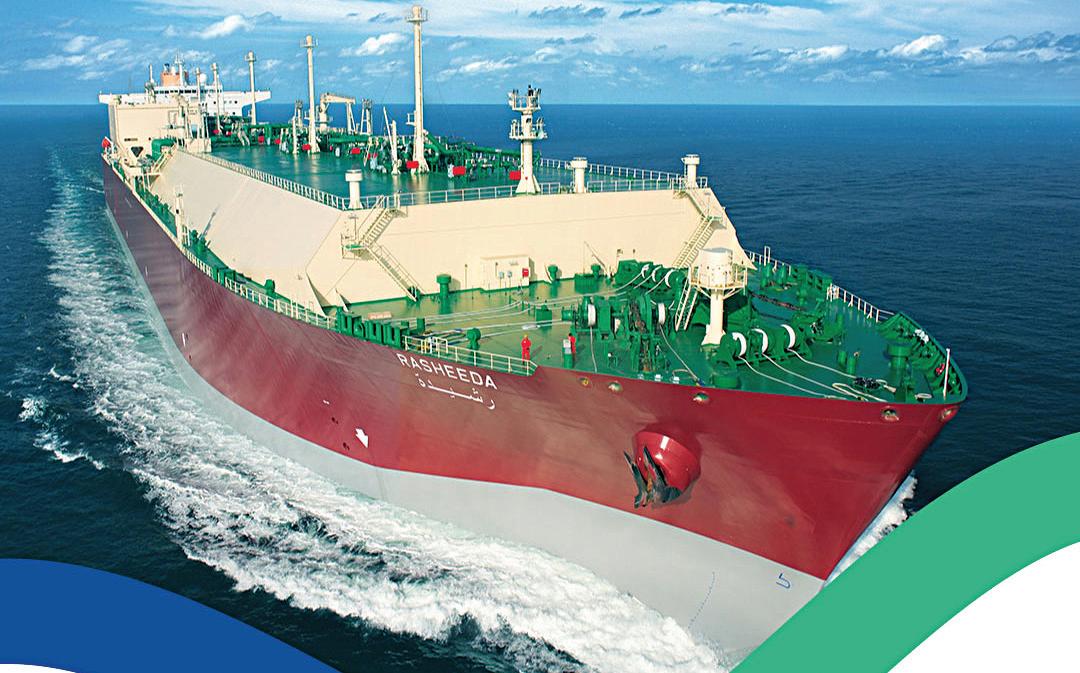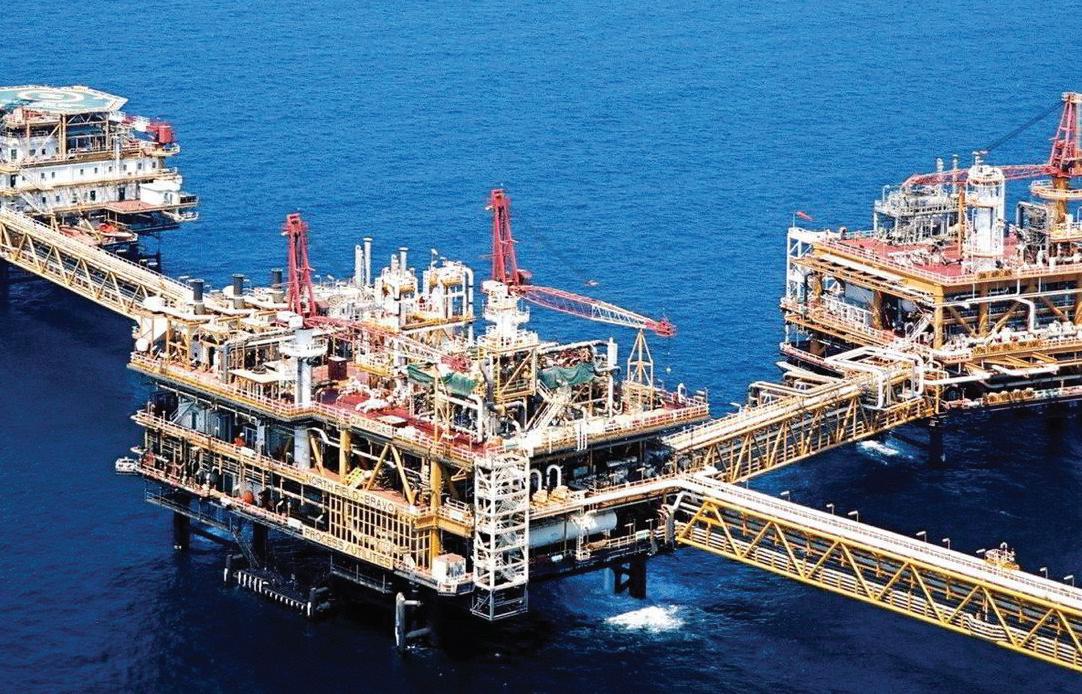
10 minute read
The Hydrocarbon Industry
Qatar has the world's third largest proven natural gas reserve and is the second-largest exporter of natural gas, according to the CIA World Factbook. Petroleum and natural gas are the basis of Qatar's economy: more than 70% of total government revenue, over 60% of gross domestic product, and around 85% of export earnings.
The State continues to focus on the energy sector as an important source of national revenue, increasing natural gas production levels and supplying 25% of the world’s total liquefied natural gas (LNG). This has positioned Qatar as the largest producer and exporter of LNG in the world and provides one of the highest per capita incomes in the world. This is due in part to the completion of Phase 1 of Qatargas' North Field gas development in 1991, leading to exports of liquefied natural gas (LNG). The North Field Expansion Project – the industry's largest ever LNG project – looks to boost production and revenues even further.
Many projects are joint ventures between the national corporation, QatarEnergy, and international entities. Under Qatarisation, joint venture industries and government departments aim to place Qatari nationals in senior management positions, an initiative that has been embraced by the hydrocarbon sector.
Qatar was a member of OPEC for nearly 60 years until January 2019. HE Saad Sherida Al Kaabi, Minister of State for Energy Affairs and President and CEO of QatarEnergy, stated at the time that Qatar’s exit from OPEC was 'not political' and that 'the withdrawal decision reflects Qatar’s desire to focus its efforts on plans to develop and increase its natural gas production from 77 mn tonnes per year to 110 mn tonnes in the coming years.' Qatar is the first Gulf country to leave OPEC.
Qatar's Energy Companies QatarEnergy
Formerly known as Qatar Petroleum, the company rebranded in late 2021 to reflect its new vision of adapting its direction and strategic objectives. The integrated national oil corporation is responsible for the sustainable development of Qatar’s oil and gas resources. QatarEnergy (QE) is also spearheading the energy and industry sector’s Strategic Qatarisation Plan to maximise the employment of Qatari nationals.
The first well, Dukhan 1, was drilled in 1939. In 1949 the first crude exports began and the first offshore concessions were granted. In 1960, Idd Al Shargi and Maydan Mahzam fields were discovered. The largest offshore field, Bul Hanine, was discovered in 1970 and came onstream in 1972.
QatarEnergy’s activities encompass the entire oil and gas value chain locally, regionally, and internationally, and include the exploration, refining, production, marketing and sales of oil and gas, liquefied natural gas (LNG), natural gas liquids (NGL), gas-to-liquids (GTL) products, refined products, petrochemicals, fertilisers, steel and aluminium. Operations are onshore at Doha, Dukhan, Mesaieed Industrial City and Ras Laffan Industrial City, as well as offshore at Halul Island, offshore production stations, drilling platforms, and the North Field.
QE has signed Exploration and Production Sharing Agreements and Development and Production
Sharing Agreements with major international oil and gas companies, including Elf Aquitaine/Total, Anadarko Qatar, Maersk Oil Qatar, Occidental Petroleum Qatar, Qatar Petroleum Development, Talisman Energy Qatar, GDF Suez, China National Offshore Oil Corp and Qatar Shell.
Ongoing projects include:
• The Barzan Gas Project to develop approximately 1.9 bn cubic feet per day (cfpd) of North Field wellhead gas, and 1.4 bn cfpd of sales gas for the domestic market in addition to associated condensate ethane, LPG and sulfur.
• Redevelopment of the Bul Hanine offshore oil field to prolong the field’s life by countering production decline and doubling oil production.
• A new Petrochemicals Complex in Ras Laffan Industrial City with partner Chevron Phillips Chemical Company LLC. The USD6 bn complex will have an ethane cracker with a nameplate capacity of 1.9 mn tons of ethylene per annum, making it the largest ethane cracker in the Middle East and one of the largest in the world.
• The North Field Expansion Project, with four new LNG trains to raise LNG production capacity from 77 mn tons per annum (MTPA) to 110 MTPA, as well as 4,000 tons per day (tpd) of ethane, 260,000 barrels per day (bpd) of condensate, 11,000 tpd of LPG, and approximately 20 tpd of pure helium.

QatarEnergy’s Industrial Cities Directorate
QatarEnergy's Industrial Cities are developed and operated according to international standards for the sector, with a focus on health and safety and sustainable development practices.
Ras Laffan Industrial City (RLIC) is 80 km from Doha along the northeast coast. It was established in 1996 and is now one of the fastest-growing industrial cities in the world. Industries in RLIC: Qatargas, Pearl GTL and Oryx GTL, Al Khaleej Gas, Dolphin Energy Limited, Laffan Refinery 1 & 2, Ras Laffan Olefins Company, Ras Laffan Helium, Qatar Power, Ras Girtas Power and Ras Laffan Power, and Erhama Bin Jaber Al Jalahma Shipyard.
Mesaieed Industrial City (MIC), 40 km south of Doha, is a hub for petrochemicals, chemical fertilisers, oil refining and metallurgical industries. Industries in MIC: QE Mesaieed Refinery, Qatar Petrochemical Co, Qatar Fertiliser Co, Qatar Chemical Co, Qatar Steel, Qatar Aluminium Co, Qatar Vinyl Co and Qatar Fuel Additives Co.
Dukhan Concession Area (DCA) is 80 km west of Doha and produces about 180,000 bpd of oil. Crude oil is exported through the terminal operations department at Mesaieed and also supplied to the QE Refinery, while condensates are sent to the QE Refinery in Mesaieed.
Al Kharsaah Solar PV Power Plant (KSPP), inaugurated by the Amir, HH Sheikh Tamim bin Hamad Al Thani in October 2022, is 80 km west of Doha, and is the first in Qatar and one of the largest in the region, with a total capacity of 800 megawatts (MW). KSPP covers 10 sq km with more than 1.8 mn solar panels utilising tracking technology to follow the sun's movement to maximise daily production. Robotic arms and treated water clean the solar panels at night to boost production efficiency. The power plant has been developed and is operated by Siraj 1, which is jointly owned 40% by a consortium formed by TotalEnergies (49%) and Marubeni (51%) and 60% by QE Renewable Solutions. The project includes a 25-year Power Purchase Agreement between Siraj 1 and Kahramaa. KSPP can supply 10% of the country's peak power consumption and will avoid 26 mn tons of CO2 emissions during its lifetime. qatarenergy.qa
North Oil Company (NOC)
A joint venture to operate and further develop the Al Shaheen oil field for the next 25 years, owned by QE (70%) and Total (30%). Al Shaheen oil field is in Qatari waters 80 km north of Ras Laffan with 33 platforms and more than 300 wells, producing around 300,000 barrels of oil per day from Qatar’s largest offshore oil field and one of the largest offshore oil fields in the world. noc.qa
ORYX GTL Ltd
Established in 2003 to develop, construct, and operate Qatar’s first GTL plant, converting natural gas into high quality GTL products including diesel, naphtha, and LPG. ORYX GTL is a 51:49 joint venture between QE and Sasol Middle East and India, manufacturing more than 32,400 bpd of high specification GTL diesel, naphtha and LPG. The naphtha is exported from Ras Laffan and marketed by Qatar International Petroleum Marketing Co (Tasweeq) to customers in the Middle East and Far East. oryxgtl.com.qa
Qatargas
The largest LNG producer in the world, operating 14 LNG trains with a total annual production capacity of 77 MTPA. Established in 1984, the first production was in 1996. Qatargas now delivers cargos to 31 countries to meet the world’s demand for safe, reliable and clean energy. Additionally, Qatargas is a leading exporter of natural gas, helium, condensate and associated products. Qatargas also operates the Jetty BoilOff Gas facility, Al Khaleej Gas, Barzan Gas, Ras Laffan Helium, the two Laffan Refineries (among the largest condensate refineries in the world), and the Ras Laffan Terminal. qatargas.com
Qatar Chemical Company Ltd (Q-Chem)
Owned by Mesaieed Petrochemical Holding Company QSC (MPHC) (49%), Chevron Phillips Chemical International Qatar Holdings LLC (49%), and QE (2%). MPHC is majority owned by QE. The Q-Chem facility produces high- and medium-density polyethylene (HDPE and MDPE), 1-hexene and other products, using technology provided by Chevron Phillips Chemical.
The Q-Chem complex in MIC has a production capacity of 453,000 MTA of polyethylene and a production capacity 47,000 MTA of 1-hexene. The adjacent Q-Chem II facility produces 350,000 MTA of HDPE. Ras Laffan Olefins Company Ltd, owned by Q-Chem II, Qatofin and QE, produces 1.3 MTPA of ethylene cracker and is operated by Q-Chem II. qchem.com.qa
Qatar Fertiliser Company (QAFCO)
Incepted in 1969 as a joint venture company to produce chemical fertilisers, the first significant step in Qatar’s industrial diversification programme to utilise its abundant natural gas resources. QAFCO is now owned by Industries Qatar (IQ) (75%) and Yara Nederland BV (25%). The majority of IQ shares are owned by QE, making QE the ultimate parent of the company.
QAFCO inaugurated its first plant in 1973. Today there are six ammonia and six urea completely integrated trains, a melamine plant and two urea formaldehyde plants. QAFCO is the world’s largest single-site producer of ammonia and urea, with an annual production capacity of 3.8 mn metric tonnes (MT) of ammonia and 5.6 mn MT of urea, exported via Muntajat Co. QAFCO also has two urea formaldehyde plants producing 60,000 MTPA of UFC85, the anti caking agent vital to urea production. The Qatar Melamine Plant is the largest in the Middle East and one of the largest in the world, with a production capacity of 60,000 MTPA qafco.com
Qatar Fuel Additives Company Limited (QAFAC)
A Qatari joint stock company operating facilities at MIC for the production of methanol and methyl tertiary butyl ether (MTBE). Since the 1960s methanol has been produced from petroleum, naphtha and natural gas, and is a clean energy source and raw material for many everyday items. The QAFAC methanol plant can produce 2,950 metric tons a day of US Federal Grade AA methanol from the natural gas provided by QE. The majority is exported to the Far East, Europe, India and the GCC region.
The QAFAC MTBE plant produces around 1,830 metric tons a day by processing methanol from the on-site methanol plant and field butane from QE. It is then used by the QE Refinery at Mesaieed to replace lead in Qatar's gasoline. The main international markets are the Far East, Europe, South America and the GCC. qafac.com.qa
Qatar Fuel Company (WOQOD) QPSC
Distributes fuel products within Qatar – diesel and gasoline, marine fuel and aviation fuel – with fuel distribution depots in Mesaimeer and Ras Laffan. WOQOD has a fleet of road tankers, an extensive network of petrol stations, and vessels for supplying marine fuel. Qatar was the first GCC country to convert to fully unleaded gasoline and WOQOD’s diesel has the lowest sulfur content in the region. WOQOD also fulfils Qatar's energy needs with ecofriendly fuel products like LPG and compressed natural gas, and has also diversified into retail marketing with Sidra convenience stores at their fuel stations. woqod.com.qa
Qatar Petrochemical Company (QAPCO)
Established in 1974 and a joint venture between IQ (80%) and TotalEnergies (20%). QAPCO is one of the largest manufacturers of low-density polyethylene (LDPE) in the region. Joint ventures include Qatar Vinyl Co, Qatofin Co Ltd, and Qatar Plastic Products Co.
QAPCO main facilities consist of an ethylene plant (cracker) with a production capacity of up to 830,000 MTPA, three LDPE plants with a total combined production capacity of over 795,000 MTPA, and a sulfur plant with a production capacity of up to 70,000 MTPA. As by-products, the ethylene plant produces LPG with an annual capacity of up to 55,000 MTA and hydrogenated pyrolysis gasoline with a capacity of up to 45,000 MTA. qapco.com
Qatar Plastic & Wooden Products Co (QPPC)
Established in 1998 with commercial production commencing in 2000. The company is owned by shareholders QAPCO and Qatar Industrial Manufacturing Co. Around 90% of production is sold domestically with the remainder marketed in other Gulf countries and Europe. The production facility is located at MIC, producing plastic film for industrial packaging. The company produces form, fill and seal film, shrinkable film and hood, construction foil, greenhouse and agricultural film, general purpose film, heavy duty trash bags, and wood-plastic composite.
Qatar Wooden Products Co commenced commercial production in 2013, a fully automatic wooden pallet production line and heat treatment facility able to produce 1.6 mn wooden pallets a year for QAPCO and other petrochemical companies. qppc.net
Ras Laffan Power Company Limited QPSC (RLPC)
Established in 2001 and the provider of electricity and water in Qatar. RLPC is a joint venture company owned by Qatar Electricity & Water Co (80%), QE (10%) and Gulf Investment Corporation of Kuwait (10%). RLPC has a 25-year Power and Water Purchase Agreement with Kahramaa and a 25-year Fuel and Seawater Supply Agreement with QE. The RLPC plant at RIC contributes 18% of the country’s power supply and 23% of the country’s water supply and is operated by Ras Laffan Operating Co WLL. rlpc.net
International Companies
ConocoPhillips
The world’s largest independent exploration and production company based on proved reserves and production of liquids and natural gas with operations and activities in 20 countries. In Qatar, the ConocoPhillips Global Water Sustainability Center at Qatar Science and Technology Park (QSTP) focuses on innovative solutions to treat produced water from the oil and gas industry as well as desalination, recycling, awareness and conservation. CSR in Qatar includes the Kulluna Health and Safety campaign, in partnership with Hamad Medical Corporation. conocophillips.com
ExxonMobil
One of the largest publicly traded international energy refiners and chemical companies. In Qatar, ExxonMobil has partnered with QE to develop the North Field, participating in 12 of the current 14 LNG trains, 27 of the world’s largest LNG ships, and Qatar’s largest condensate refinery. ExxonMobil is the only foreign participant in Al Khaleej Gas and Barzan Gas domestic gas projects. ExxonMobil also has partnered with QE in two LNG receiving terminals in Europe, an export terminal in the US, and in energy projects around the world. The company provides technical and management expertise to QE through technical services and secondments of ExxonMobil employees, while the ExxonMobil Research Qatar at QSTP conducts research in areas of mutual interest. exxonmobil.com.qa
Sasol
An international integrated chemicals and energy company that develops and commercialises technologies, and builds and operates world-scale facilities to produce a range of high-value product streams, including liquid fuels, chemicals and low-carbon electricity. In Qatar, Sasol is a 49% shareholder with QE in ORYX GTL, which uses Sasol proprietary GTL technology to convert natural gas into liquid fuel and chemical products. sasol.com

Shell
The largest international investor in Qatar. QE and Shell have jointly delivered two of the largest energy projects in the world in RLIC. Pearl Gas-to-Liquids (GTL) is the world’s largest GTL plant, costing USD19 bn, and the largest single investment in the Shell Group’s global portfolio. The Qatargas 4 LNG project (QE 70%, Shell 30%) combines Shell’s global leadership in LNG with Qatar’s position as the world’s largest LNG supplier. The Qatar Shell Research & Technology Centre at QSTP is a world-class research and development facility and learning centre, with USD100 mn invested on programmes in support of energy and the environment. shell.qa
TotalEnergies
A broad energy company that produces and markets oil and biofuels, natural gas and green gases, renewables, and electricity. Active in more than 130 countries, TotalEnergies puts sustainable development in all its dimensions at the heart of its projects and operations to contribute to the wellbeing of people. In Qatar, TotalEnergies has been present since 1936, and is active in all areas of Qatar’s oil and gas sector – from exploration and production to refining, petrochemicals, marketing of lubricants, and solar energy. totalenergies.qa m









